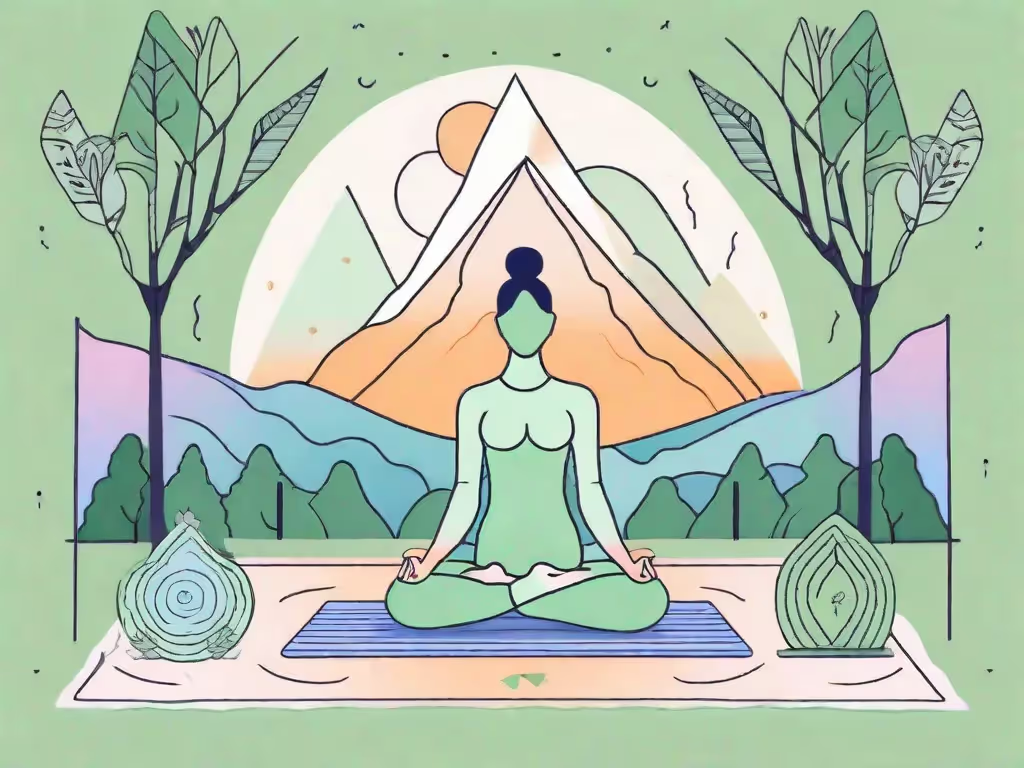In today's fast-paced world, finding inner peace and clarity can seem like an elusive goal. But for practitioners of Zen Buddhism, meditation serves as a powerful tool in the pursuit of enlightenment. By delving into the origins and principles of Zen Buddhism, exploring the role of meditation, and understanding the techniques and benefits, we can uncover the path to clarity and enlightenment that Zen Buddhism offers.
Understanding Zen Buddhism
Zen Buddhism, also known as Chan Buddhism, originated in China during the 6th century and later spread to Japan. It is a school of Mahayana Buddhism that emphasizes direct experience and intuitive understanding over scholarly study and intellectualism. The essence of Zen lies in the concept of "awakening" or "enlightenment" - a state of deep inner clarity and insight.
The principles of Zen revolve around non-dualism, meaning that there is no separation between the self and the external world. It emphasizes the importance of being fully present in the current moment, free from attachments and distractions. This state of presence allows individuals to experience reality directly, without the filter of conceptual thinking.
Through meditation, Zen practitioners aim to quiet the mind and cultivate a deep sense of awareness. This practice is not limited to sitting meditation, but extends to every aspect of daily life. By being fully present in each moment, whether it be eating, walking, or working, Zen practitioners seek to bring a sense of mindfulness and clarity to their actions.
Origins of Zen Buddhism
The origins of Zen Buddhism can be traced back to the teachings of the Indian monk Bodhidharma, who is said to have traveled to China in the 5th century. Bodhidharma's teachings emphasized direct experience and the transmission of wisdom beyond words and scriptures. He is considered the first patriarch of Zen Buddhism and his teachings laid the foundation for the development of Chan Buddhism in China.
Over time, Chan Buddhism evolved and incorporated elements of Chinese Taoism, resulting in a unique blend of spiritual practices and philosophical insights. It was during the Tang Dynasty (618-907) that Chan Buddhism gained prominence in China, attracting many followers and influential masters.
Principles of Zen Buddhism
The principles of Zen Buddhism are deeply rooted in the teachings of the Buddha, but with a distinct emphasis on direct experience and intuitive understanding. Zen practitioners seek to go beyond intellectual knowledge and concepts, and instead, directly experience the nature of reality.
One of the key principles of Zen is non-dualism, which asserts that there is no separation between the self and the external world. This means that the boundaries we perceive between ourselves and others, between subject and object, are ultimately illusory. Zen teaches that by recognizing this non-dual nature of reality, we can transcend suffering and find liberation.
Another important principle of Zen is the concept of impermanence. Zen practitioners understand that all things are in a constant state of flux and change. By accepting and embracing this impermanence, they learn to let go of attachments and expectations, finding freedom in the present moment.
The Role of Meditation in Zen Buddhism
Meditation is at the core of Zen Buddhism, serving as a means to awaken one's true nature and achieve clarity and enlightenment. Unlike other forms of meditation, Zen meditation focuses on direct experience rather than visualization or concentration techniques.
Through meditation, practitioners seek to transcend conceptual thinking and tap into the depths of their consciousness. By sitting in stillness and silence, they aim to quiet the chatter of the mind and connect with their true essence. This requires discipline, patience, and deep self-inquiry.
Zen meditation, known as zazen, involves sitting in a specific posture and allowing thoughts to arise and pass without judgment or attachment. The practice is supported by focused attention on the breath, which helps to anchor the mind in the present moment. Through consistent practice, Zen meditators develop a heightened sense of awareness and a deepening understanding of their own mind and the nature of reality.
Outside of formal meditation sessions, Zen practitioners also engage in various mindfulness practices throughout the day. This includes activities such as walking meditation, tea ceremony, and mindful eating. The aim is to bring the same level of presence and awareness to all aspects of life, blurring the boundaries between meditation and daily activities.
The Path to Clarity and Enlightenment
Defining Clarity and Enlightenment in Zen Buddhism
Clarity in Zen Buddhism refers to a state of mind free from delusions, attachments, and distractions. It is a state of deep awareness and insight, where one sees things as they truly are. Enlightenment, on the other hand, is the ultimate goal of Zen practice. It is a profound awakening that transcends ordinary consciousness and brings about a complete transformation of the self.While the concept of clarity and enlightenment may seem abstract, Zen teachings emphasize that they are attainable through dedicated practice and deep self-reflection.
The Process of Seeking Clarity and Enlightenment
The process of seeking clarity and enlightenment in Zen Buddhism is dynamic and experiential. It involves regular meditation practice, self-inquiry, and guidance from a qualified teacher. Practitioners often engage in koan study, which involves contemplating perplexing questions or statements to break through their conceptual thinking.The journey towards clarity and enlightenment is not linear but requires patience, perseverance, and an open mind. It involves facing and transcending personal limitations, letting go of attachments, and surrendering to the present moment.
Zen Meditation Techniques
Zazen: The Art of Sitting Meditation
Zazen, or sitting meditation, is the primary meditation technique in Zen Buddhism. It involves sitting upright in a crossed-legged position, maintaining a relaxed yet alert posture. The focus of zazen is on breath awareness and allowing thoughts and emotions to arise and pass without attachment or judgment.By cultivating sustained concentration and mindfulness, zazen helps quiet the mind and develop a deep sense of presence and self-awareness. Regular practice of zazen can lead to a heightened state of clarity and insight.
Kinhin: Walking Meditation in Zen Buddhism
In addition to sitting meditation, Zen practitioners also engage in kinhin, or walking meditation. Kinhin involves slow, deliberate walking in a circular path while maintaining mindfulness and awareness of each step. It provides an opportunity to bring the calm and clarity of sitting meditation into daily activities.By integrating kinhin into their practice, practitioners develop a seamless awareness that extends beyond formal meditation sessions. It fosters a deeper connection with the present moment and cultivates mindfulness in all aspects of life.
The Benefits of Zen Meditation
Mental and Emotional Benefits
Zen meditation offers a myriad of mental and emotional benefits. Regular practice can help reduce stress, anxiety, and depression by promoting a sense of calm and equanimity. It improves focus, concentration, and cognitive abilities, allowing for greater clarity and creativity in problem-solving.In addition, Zen meditation fosters emotional resilience and the ability to navigate through challenging emotions with grace and acceptance. It cultivates a compassionate and non-judgmental attitude towards oneself and others, enhancing emotional well-being and relationships.
Spiritual Growth and Enlightenment
At its core, Zen meditation is a spiritual practice aimed at uncovering the true nature of reality and attaining enlightenment. It provides a path for deep self-discovery and self-transcendence. By letting go of clinging to illusions and delusions, practitioners can experience a profound transformation that leads to liberation and ultimate freedom.Through regular meditation and diligent practice, individuals can cultivate a deep sense of spiritual connection, finding meaning, purpose, and direction in life. Zen meditation opens the gateway to awakening to one's true self and experiencing the profound interconnectedness of all things.
Common Challenges in Zen Meditation
Overcoming Distractions and Mental Blocks
During meditation, practitioners often face distractions and mental blocks that hinder their progress. Thoughts, emotions, and physical sensations may arise, pulling attention away from the present moment. However, instead of viewing these distractions as obstacles, Zen teachings encourage practitioners to embrace them as opportunities for insight and understanding.By cultivating non-judgmental awareness, practitioners learn to observe these distractions without getting entangled in them. They develop the ability to gently redirect their focus back to the breath, fostering a sense of inner stillness and clarity.
Dealing with Physical Discomfort
Sitting in meditation for extended periods can sometimes be physically uncomfortable. Postural discomfort, stiffness, and pain can arise, testing the practitioner's ability to cultivate mindfulness and equanimity. However, Zen teachings remind practitioners that the body's sensations are impermanent and transient. By bringing mindful awareness to physical discomfort, practitioners learn to detach from the sensations and observe them with curiosity and acceptance. They may also explore different sitting positions or incorporate mindful movement practices to alleviate physical tension.
Throughout this article, we have explored the meditation goal in Zen Buddhism: seeking clarity and enlightenment. By delving into the origins and principles, understanding the role and techniques of meditation, and recognizing the benefits and challenges, we have uncovered the path to clarity and enlightenment that Zen Buddhism offers.
Remember, if you're interested in deepening your meditation practice and exploring Zen Buddhism further, consider using the Aura Health App. It provides a treasure trove of resources, guided meditations, and insights to support your journey towards inner peace and spiritual growth. So, take the first step and embark on this transformative path today.
Aura is Your All In One App for Meditation, Mindfulness Wellbeing
Find peace every day with one app for your whole well-being. There is no one-size-fits-all solution to mental well-being. Aura is the first all-in-one wellness app that learns how to best help you. Discover an endless library of expert-created tracks for your well-being, all taught by the world’s best coaches, therapists, and storytellers. With Aura's personalized recommendations, you can find peace every morning, day and night.



.webp)






.avif)

%20(1).avif)


.avif)
.avif)
.webp)


.avif)


















































































































.avif)

















.svg)









